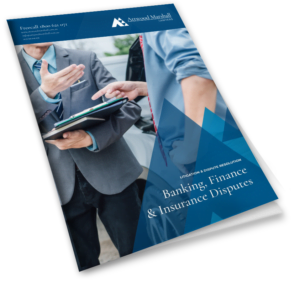As the festivities wrapped up on Christmas day, storms ravaged the eastern seaboard. The terrifying storms destroyed homes, took lives, and left thousands without power. More wild weather hit New Year’s Eve, causing flash flooding and further destruction. Now, the battle begins for many who are left frustrated, waiting for a response from their insurer or trying to find out the status of their claim. Here, we provide some helpful tips when making an insurance claim and what immediate support is available.
When disaster strikes, understanding your insurance policy is crucial. While home and contents insurance typically covers damage from storms, fire, theft, and more, scrutinising the fine print of your policy is essential.
If you have a valid home and contents insurance policy, it should cover you for damage caused by:
- Storm and rainwater (flood cover is often optional or an “extra”)
- Lightning
- Impact at home, such as fallen trees
- Fire
- Theft (or attempted theft)
- Escape of liquid, such as a burst pipe
- Breakage of glass, ceramic and sanitary fixtures
- Malicious damage, vandalism, riot, or civil commotion
- Explosion
- Earthquake or tsunami.
Understanding precisely what your insurance policy covers can be overwhelming. Usually, it is only when you attempt to lodge a claim that you unravel the long list of terms and conditions.
When you take out insurance, PDS statements that insurers provide you can be extremely lengthy and written in a difficult way to interpret. If your claim is denied, it is important to seek expert legal advice to understand your rights and what options may be available to you.
Tips for making an insurance claim
- Act fast: Taking action quickly is key to initiate a successful insurance claim. Contact your insurer as soon as possible.
- Understand your cover: Thoroughly read your policy and product disclosure statement.
- Gather evidence: Collect as much information and evidence as you can to support your claim. This can include photos and video footage of the damage to your property. Make a list of the items that have been damaged, including items that may have been destroyed inside your home. If you have receipts, warranties, or bank statements showing the purchase of these items to prove their value, start getting these together.
- Keep records: When communicating with the insurer, keep written or typed notes of all your communication and the dates these took place.
- Know your rights: If you are struggling to get in contact with your insurance company or they are not returning your call in a reasonable timeframe, you have rights. An insurer must respond to your claim within ten business days of receiving the claim. If the insurer stalls or denies your claim unfairly, you can complain to the Insurance Code Compliance Committee online, via email, or over the phone. For more information, click here. You can also refer the matter to the Australian Financial Complaints Authority (AFCA) if this is unsuccessful.
Understanding your cover and exclusions
Storm damage
Most insurance policies cover you for damage because of “storm,” “rainwater” and “runoff”. The exact definition of each of these words will depend on the definitions within your policy. Generally, they mean:
- Storm: a storm, cyclone or severe atmospheric disturbance that can be accompanied by rain, strong winds, lightning, hail, or dust;
- Rainwater: water falling from the skies that runs off over the surface of the land (many include overflowing water from stormwater drains);
- Runoff: rainwater that has collected or flowed across from ordinarily dry ground or overflowed from pools or spas.
If the insurance company establishes that both rainwater and floodwater damaged your home, and you are not covered for flood damage, they may reject the claim. If this happens, you should seek legal advice immediately, as there may be arguments the insurance company has failed to consider.
If you live in a coastal area, you may not be covered for damage caused by a storm surge (a rush of water onshore caused by strong winds pushing the ocean’s surface) or movements caused by the sea (not including tsunamis).
You should check your insurance policy if your home is damaged by storm surge, as some claims may be approved if it can be shown that the damage caused by the storm surge occurred simultaneously with damage caused by a storm.
If there is an issue about the source or the extent of damage, the insurance company may hire experts (such as an engineer) to prepare a report. You are entitled to see the documents that the insurance company rely on to assess your claim. The results of the reports are not conclusive and can be challenged.
If your claim is denied, you should ask for a copy of the written document stating why your claim was rejected, and if you believe the decision was unwarranted, obtain advice from an experienced insurance dispute lawyer who can help review your claim and advise you of the next steps you should take.
Flood damage
Some insurers offer flood cover as a standard inclusion for home and contents policies. However, some insurers exclude flood cover altogether and other insurers treat flood cover as an optional extra.
Even if your policy excludes flood damage, you may still have cover for storm or rainwater damage.
Since 2014, most home and contents insurance policies use a standard definition to define “flood” as:
The covering of normally dry land by water that has escaped or has been released from the normal confines of any of the following:
- Lakes
- Rivers
- Creeks
- Another natural watercourse
- Reservoirs
- Canals
- Dams
If your insurer didn’t advise you that your policy excluded flood damage, in some cases, you might be able to contest whether your insurer informed you that you are not covered for such damage. Consider if any of the following apply to you:
- Did your insurer tell you that you were covered for flood? Many insurers keep voice recordings of your conversations, which you can request.
- Did your insurer send you the policy documents within the 14-day cooling-off period? Many insurers keep records about when the documents were sent, and you can request this information.
- Is there any confusion or ambiguity in the wording of the insurance policy?
If any of the above apply to you, you may be able to argue that you should still be covered.
What to do if you are unhappy with your insurer’s decision
Time and time again, policyholders affected by devastating natural disasters are hurt by the poor decisions of their insurance providers.
In 2022, nearly $6 million had to be clawed back from insurance companies after people affected by the New South Wales and Victorian flood disasters suffered because of the conduct of their insurance providers.
The insurance watchdog received thousands of complaints following these devastating events.
A year on, we hope the insurance companies have spent the time to review their services, operations, and resources to ensure customers will be better protected this time around.
If you are unhappy with the decision made by your insurer about your claim, you have several options available to you.
Firstly, you can request that the insurer’s internal dispute resolution department review the insurance claim rejection decision.
Alternatively, you can lodge a complaint with AFCA.
If you would like to discuss your options and the decision made by your insurer with a legal professional, our insurance dispute lawyers can provide a free initial 30-minute consultation to discuss your matter and advise you of the best path forward.
Available assistance and grants
The following disaster assistance grants are available for residents impacted by the recent Gold Coast storms:
- Emergency Hardship Assistance: $180 for individuals and up to $900 for families of 5 or more to help with essential needs, food, medication, clothing, and temporary accommodation.
- Essential Services Hardship Assistance: $150 for individuals and up to $750 for families of 5 or more to help with essential services such as power, gas, water, and sewerage.
- Essential Household Contents Grant: $1,765 for individuals and up to $3,000 for couples or families to replace essential lost household contents, such as bed linen and white goods. This grant is available if you are uninsured or unable to claim insurance and meet the income limits.
- Essential Services Safety and Reconnection: A grant to cover inspections costs of $200 for safety inspection for water, electricity, gas, and sewerage, or $4,200 for repairs or replacement of these services. This grant is available if you are uninsured or unable to claim insurance and meet the income limits.
- Structural Assistance Grant: Up to $50,000 for uninsured, low income, owner-occupiers to help repair their home and make it safe, secure, and habitable. This grant is available if you meet the income limits, you are uninsured or unable to claim insurance, and your home has become structurally unsafe to live in.
To find out more about the disaster relief grants, or to complete an application, click here.
Attwood Marshall Lawyers – supporting you through life’s toughest times
Attwood Marshall Lawyers is available to answer any questions you may have about making an insurance claim for storm or flood damage, and we are offering a free initial consultation to help you navigate the claim’s process.
For more information or to discuss your specific circumstances, please contact our Commercial Litigation Department Manager, Amanda Heather on direct line 07 5506 8245, email aheather@attwoodmarshall.com.au or free call 1800 621 071.
 Free Info Pack
Free Info Pack
To find out more about resolving disputes with banks and insurance companies, provide your details below and our Information Pack will be sent to your inbox.
 Free Info Pack
Free Info Pack

